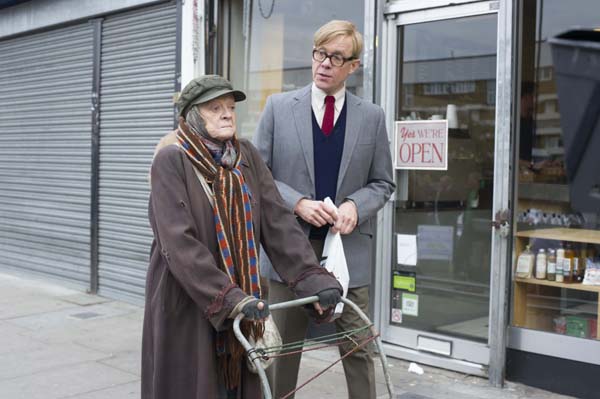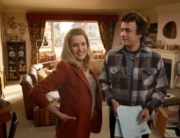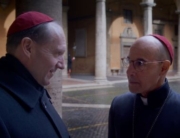England is famous for a long tradition of eccentrics and a tolerance of their idiosyncrasies. The Lady in the Van celebrates and humanizes the continuation of this quaint pattern through the last quarter of the 20th century, as embodied by the indomitable Dame Maggie Smith.
Her Miss Shepherd is based on the real woman who playwright/screenwriter Alan Bennett (best known in the United States for The Madness of King George and The History Boys) first wrote about in a 1989 memoir. On his lovely London crescent block already populated with distinctive characters (most notably represented here by Frances de la Tour portraying a redoubtable Mrs. Vaughan Williams), the van housing Miss Shepherd, with her worldly detritus, parks down the slope but ends up in Bennett’s driveway, where he reluctantly lived alongside her for almost 20 years. (Director Nicholas Hytner has vivid memories of walking by that van/eyesore on his way to work before he started his years of collaboration with Bennett.)
After Bennett’s piece about Miss Shepherd generated information on her biography, he expanded her story 10 years later into a radio play, then onto the West End starring Dame Maggie. While that 1999 theatrical production notably featured set designs from her imagination, the film version begins grounded in realism, with a flashback to the traffic accident that marred her life. The poignant and sometimes over-explained intersections in her past life continue throughout and veer toward the sentimental: visits with her suburban brother and her life in a grim convent. But she’s mostly a thorn in Bennett’s side, arriving when he seems to be going through a midlife crisis, while he and his disapproving alter-ego (portrayed like identical twins by Alex Jennings) wrestle self-indulgently over his productivity and creativity as a writer. Young male one-night stands (paid or unpaid) join him après theater or parade by each morning, until he finally settles down into a steady relationship. (Briefly glimpsed are Bennett’s drolly comic stage monologues, more familiar to British audiences than Americans.)
But this is mostly Dame Maggie’s show, and when she’s not on screen marking the holidays and the years going by, the film becomes thin. While Miss Shepherd has more patronizing attitude than money (unlike Downton Abbey’s countess, who has both), the actress has richer material to work with in her filthy, odiferous vehicle than in what Israel Horovitz gave her for last year’s similarly immovable but middle-class character in My Old Lady. The neighborhood’s mostly indulgent attitude to Miss Shepherd makes for an interesting sociological comparison with Sebastián Silva’s Nasty Baby, in which Americans’ view of a homeless character is seen as dangerous. (Miss Shepherd, though, has the benefit of government social workers and the national health system as she ages.)
Following limited release now in New York and Los Angeles, expanded distribution on January 15, 2016 will coincide with the final season of Downton Abbey.







Leave A Comment